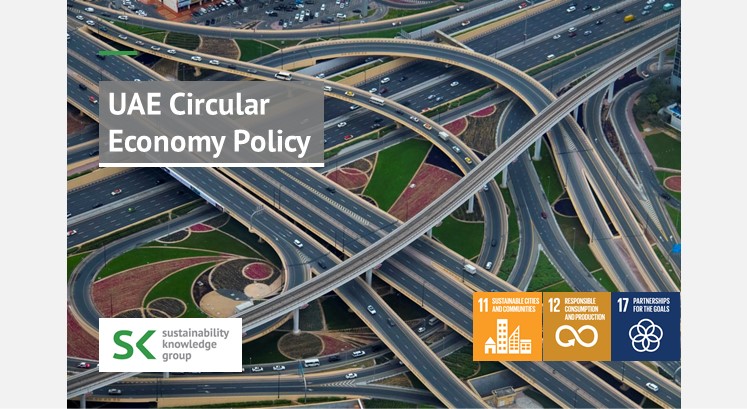The increase in world’s population and the global demand for resources is increasing pressure on the environment. The traditional understanding of economic activity is based on the approach of “take-make-dispose”, a linear model, which ignores high economic, environmental and social costs. The circular economic model on the other hand, focuses on the five stages of the lifecycle of products and services: design, production, consumption, waste management and secondary materials treatment and provides a new holistic approach the has environmental benefits, cost savings and leads to the creation of new markets.
The UAE trend towards a circular economy
In the Gulf Cooperation Council alone, the circular economy is expected to save up to $138 billion by 2030. The UAE is working to accelerate the pace of implementation of circular economic standards, which ensures the achievement of the UN Sustainable Development Goals (SDGs), and adoption of sustainability across the economy.
In January 2021, the “UAE’s Circular Economy Policy” was adopted. The policy is a comprehensive framework that defines the UAE’s directions in achieving sustainable management and efficient use of natural resources, by adopting methods and techniques of consumption and production. The policy aims to minimise the natural resources consumption, reduce waste, and ensure the quality of life for current and future generations.
The policy comprises several key objectives, including:
- Promoting environmental health
- Supporting the private sector in adopting clean production methods
- Reducing natural environmental stress, to achieve the country’s vision to be a global pioneer of green development
The policy is a framework that aims to define the UAE’s priorities in promoting the concept of a circular economy in several priority sectors. These sectors include green infrastructure, sustainable transport, sustainable manufacturing, sustainable food production and consumption, as well as other common areas such as technology, innovation and research and development. The framework focuses also on raising awareness, building capacities, establishing partnerships and cooperation platforms, and achieving comprehensive waste management.
The policy is expected to contribute to:
- Generating considerable economic proceeds for the country
- Mitigating environmental pressures
- Ensuring the supply of raw materials
- Increasing competitiveness
- Motivating innovation
- Strengthening economic growth
- Creating job opportunities.
To support the adoption and implementation of the new direction, the UAE Circular Economy Council was formed. The council aims to:
- Oversee the drafting of a mechanism to implement the strategy, in coordination with relevant authorities
- Adopting performance indicators for implementing the policy and aligning federal and local strategies with their requirements
- Proposing general foundations for public and sectoral plans and projects
- Promote partnership between the public and private sectors
- Promote and develop scientific studies and research in areas related to the circular economy
- Strengthening international cooperation and international partnerships in the implementation of the circular economy at the global level
“Scale 360” Initiative
The UAE, as the first signatory to the “Scale 360” initiative, which was launched in collaboration with the World Economic Forum (WEF).
The initiative aims to adopt the Fourth Industrial Revolution technologies such as the Internet of Things (IoT) and Artificial Intelligence (AI), to accelerate the transformation of a circular economy, reduce dependence on natural resources, and reduce pollution to tackle climate change.
Through this innovative initiative, it is possible to enhance the flexibility and capabilities of dealing with and adapting to all challenges. The initiative helps to provide greater transparency and monitor waste flows, thus encouraging cooperation between research institutions and developing financial mechanisms to finance this promising and profitable new sector.
Circular Economy in Europe
In 2015, the European Commission adopted a new Action Plan for the Circular Economy for a cleaner and more competitive Europe. The plan aims to promote circular economy processes, promote sustainable consumption, and ensure that the European Union economy’s resources are preserved for as long as possible.
Countries have already issued guidelines for a circular economy. The UK has issued a Circular Economy Package Policy Statement (CEP). The CEP introduces a revised legislative framework, which outlines steps to reduce waste and establish a long-term, ambitious, and reliable pathway to waste and recycling management. The Irish government has released a new Waste Action Plan for a Circular Economy. The policy document contains over 200 actions across various areas of waste, including the circular economy.
Leading institutions are already researching, promoting, and developing this concept, such as the Ellen MacArthur Foundation who works with companies and decision-makers to promote the shift to a circular economy.
The call towards a circular economy
Now more than ever before, we need to work together to implement new policies and utilize technology to strengthen resource security and ensure resilience. Moving towards a more circular economy can lead to reducing pressure on the environment, improving the security of supplying raw materials, increasing competitiveness, stimulating innovation and accelerating economic growth. Circular economy can boost jobs, growth, and investment, while promoting the transition to a carbon-neutral, resource-efficient, and competitive economy.
Photo by Nick Fewings on Unsplash

